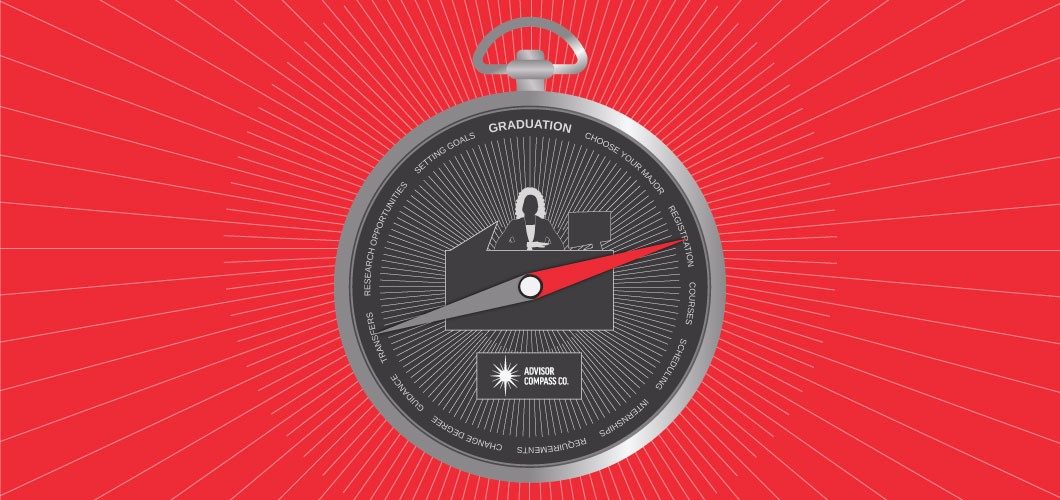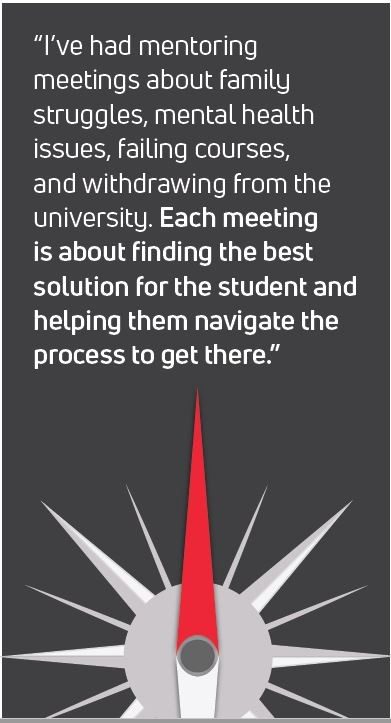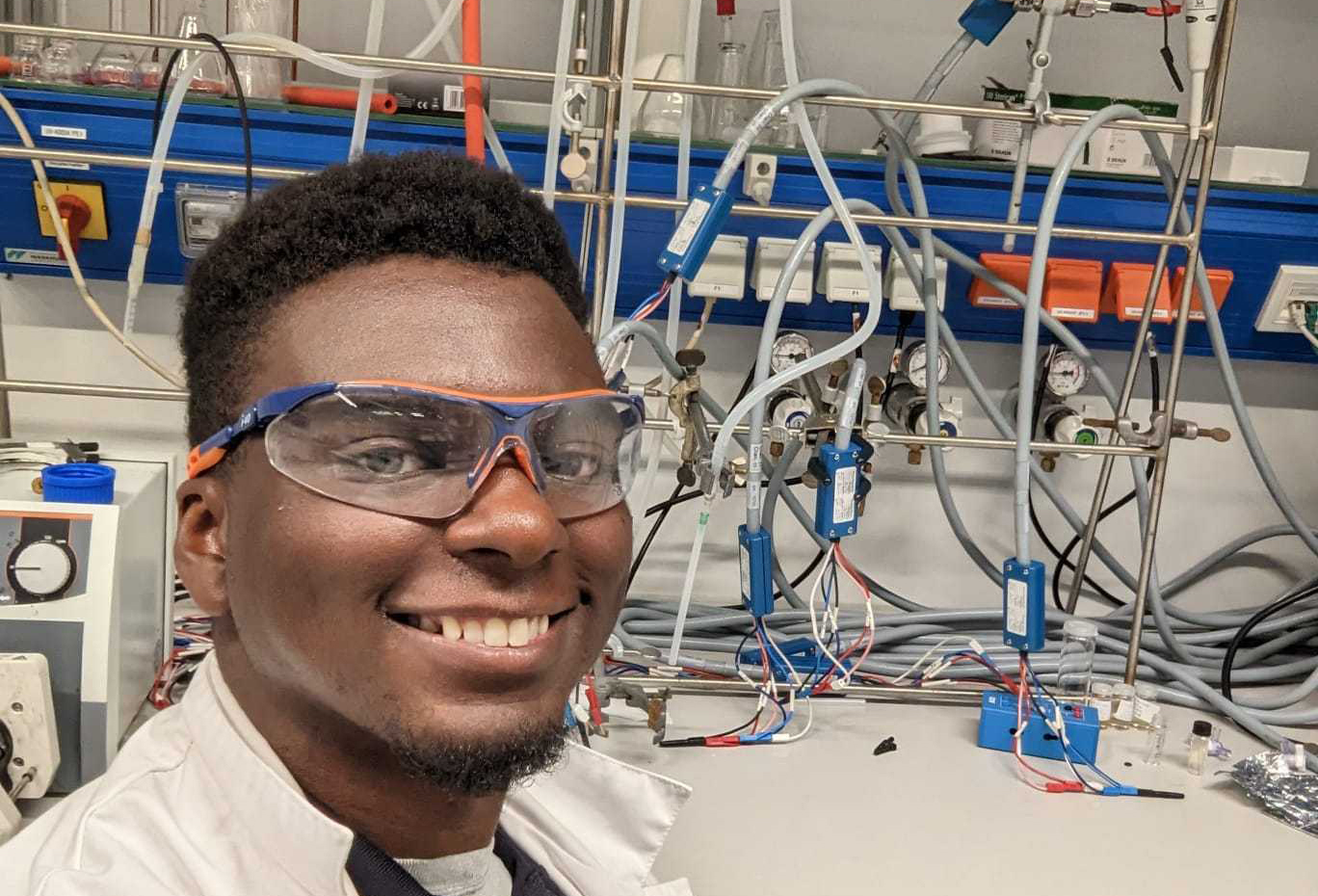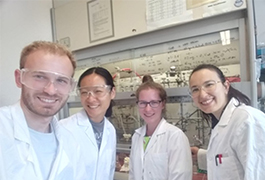Chart Your College Goals with an Academic Advisor

Academic advisors are a little like dictionaries: you have access to one, you know it’s important, and you almost always try to figure things out on your own rather than consulting one. But a good academic advisor is a valuable resource who can help you chart your path through your undergraduate years and into your career.
I’ve been an academic advisor for a few years now. I help guide students toward their ultimate goals so they have a positive college experience. If you’re wondering how academic advisors help you make the best decisions as you progress through your major, read on.
Why you have an academic advisor
As an academic advisor, my main role is to help guide students on their road to graduation. This may include giving big-picture advice, such as what degree and concentration to pursue (e.g., B.A. versus B.S., or biochemistry versus environmental chemistry). Or it may involve providing advice about requirements and strategizing about whether to add and/or drop courses, which of course comes with a host of paperwork that needs approval.
Early in your academic career, an advisor will help you learn about different chemistry majors and what you can do with a chemistry degree. Advisors also help you find opportunities to grow as a scientist, such as research positions for first- and second-year students.
An advisor can guide you in determining which courses are best for you, which sections fit into your schedule, and which resources are available to help you complete your degree on time.
Later in your academic career, an advisor will guide you through the process of applying for graduation and provide advice on determining what to do after graduation to successfully make the transition from being a student to being a professional.
You may have one advisor throughout your college career, or your advisor may change. Some universities or departments pair you with an advisor as an incoming first-year student, and that’s the advisor you work with until you graduate. Or you may have one or two advisors in your first year and then transition to a new advisor once you declare a major. Your advisor may be dependent on your concentration within your major, and double majors often have two advisors—one for each major.
Advisors have different styles, strengths, and weaknesses, but their goal is always to help you. Even if you change advisors, you can still contact a previous one with questions.
Meeting up with your advisor: when, and how often?
How often you see your advisor is somewhat up to you. You will need to see your advisor at least once a semester for registration purposes (they will make sure your courses and degree requirements are on track).
But you can get more out of your advisor if you see them more often. I have some students who come by several times during the semester for advice or guidance on specific topics. Some ask for assistance when they are considering research or internship programs. They may stop by to get involved in extracurricular activities, like a teaching assistantship, a tutoring position, or joining our ACS student chapter.
A few of my advisees come by on a more frequent (sometimes weekly) basis, and they become my mentees. These meetings often entail stories of great successes or struggles, and the students require advice and guidance specific to their circumstances. For example, I’ve talked with students about getting into research, making top scores on class exams, and being selected as the winner of scholarships or awards. I’ve also had mentoring meetings about family struggles, mental health issues, failing courses, and withdrawing from the university. Each meeting is about finding the best solution for the student and helping them navigate the process for getting there.
What an advisor can and can’t do
Understanding what your advisor can and can’t do for you is important. We can offer you open and honest communication, but it is a two-way street. Let your advisor know what your plans are. If we know what your goals are, we can better help you achieve them. If your goals or plans change (or if you’re unsure about what you want), let us know.
Academic advisors make recommendations and steer you in the direction you need to go, but it’s up to you to do the initial work. When you’re scheduled for an advising appointment, show up on time and be prepared to share your needs and goals. If you’re signing up for classes, you should come with a list of the ones you want to take. If you’re concerned about your progress, bring some examples of your work to talk about. If you’re interested in research opportunities or internships, ask your advisor about what they know, and then take that information and run with it.
Advisors work with many students and may not be available for long appointments during certain times of the semester (especially during registration season), so be respectful of their time. If you need to meet, make an appointment and let your advisor know why you are requesting the meeting. This allows your advisor to be prepared and ready to help you in the best way possible.
Ultimately, your advisor is there to advise you, but they can’t make decisions for you. The ball is always in your court to weigh the pros and cons of a scenario and make the final call.
Advisor or mentor?
Advisor is a formal role designated by an institution to guide students through the school’s enrollment procedures. Mentor is a formal or informal role to provide advice on your career, academic choices, and personal concerns.
There are several types of mentors, who fulfill specific needs. These roles can be filled by one person or multiple people.
- Academic mentors help students to build their knowledge and skills through research opportunities, internships, cooperative learning (co-op) positions, and summer research experiences for undergraduates (REUs). Some opportunities are not obvious, so mentors direct students to jobs in the fields where a student’s interests lie. Mentors can coach students on how to enter the workforce or how to apply to graduate programs.
- Research mentors not only supervise a student’s research project but can also provide guidance about future academic and career paths, and help with many of the tasks of an academic mentor.
- Personal mentors provide overall guidance and support. Studying chemistry is difficult, and everyone has moments of doubt. But a good mentor can help get you through the tough experiences, encourage you to reach your potential, and expose you to opportunities that will propel you toward your goals.
Special circumstances
Changing majors
If you’re unhappy with your major, degree, or concentration, explore changing it—even if it’s to something other than chemistry. I’ve had students express interest in changing their major but then second-guess themselves when they realized they would also change advisors. I assured them that following their passion would result in much higher career satisfaction and happiness.
I also assure students that I can still help them to the best of my ability if they have questions. A few of them have taken me up on that offer, at least until they became more comfortable with their new advisor.
Changing schools
Whether you’re transitioning from a two-year college to a four-year institution (like I did) or going from one four-year institution to another, you will face a lot of decisions and may run into some challenges. It can be stressful to leave an area, program, and advisor with which you have become familiar and comfortable.
Your current advisor can help you make an informed decision about which universities and programs may be a better fit for you. Make sure to reach out to an advisor at the new school (or schools) you are interested in. Talking to them about the transfer process, and especially about how credits are handled, can make the transition much easier. You can also ask about extracurricular activities and other opportunities available at their school.
I’m often contacted by transfer students looking for information about our academic programs and how their credits will transfer. The students who take the time to make these connections through calls or emails get information about more than they initially asked about, and they proceed with a greater sense of comfort about getting a new advisor and entering a new school.
Changing advisors
Sometimes your current advisor just isn’t working for you. You may not feel the right rapport, or the advice may not fit your needs. It’s OK to seek out another advisor. Your advisor may even be able to help you find a good replacement. If they are unable to, seek assistance from other faculty members in the department.
Most academic advisors who are faculty members have been selected for this assignment because they care deeply about the success of students. Many volunteer their time for this role because they want to help students reach their full potential and achieve specific goals. Knowing there are people who are on your side and have a wealth of knowledge and advice to share is definitely to your benefit, so don’t miss out.






